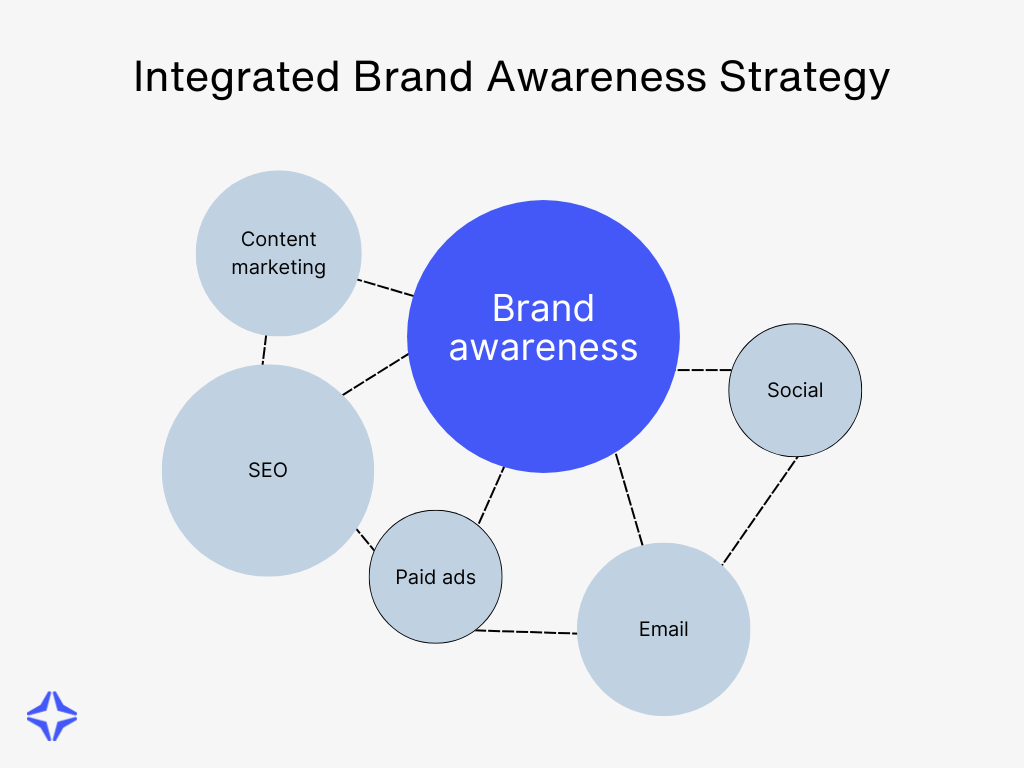In today's fiercely competitive market, establishing strong brand awareness has become more crucial than ever. Yet many businesses struggle to effectively cut through the noise and connect with their target audience. A search-first approach offers a comprehensive strategy that prioritizes visibility through search engines, creating meaningful bridges between brands and potential customers. This approach isn't just about being found, it's about being discovered precisely when users are actively seeking solutions.
Why a Search-First Approach Matters
When potential users turn to search engines with specific queries, they express immediate intent. By optimizing your digital presence for these moments, you're not merely increasing visibility, you're positioning your brand as the answer to their needs. Companies that appear prominently in search results aren't just seen; they're perceived as industry leaders with domain authority and expertise.
The digital-first approach to building brand awareness leverages the power of search engine optimization (SEO) to ensure your business appears when and where it matters most. This strategy goes beyond traditional marketing efforts by focusing on qualified traffic, people already interested in your offer. The result? Higher engagement rates, improved conversion potential, and a more substantial brand presence in your competitive market.
Understanding Your Target Audience's Needs
Identifying your target audience's specific needs and preferences forms the foundation of any successful brand awareness strategy. Innovative businesses leverage powerful tools like Google Analytics and social listening tools, which are platforms that monitor social media channels for mentions of your brand, products, or competitors, to gather actionable insights into the behaviors and interests of their ideal customers. These insights reveal what your customer base is searching for, how they're searching, and what language they use.
By analyzing user behavior patterns, you can craft marketing materials that speak directly to your target market's desires and pain points. This understanding enables the creation of tailored content across various marketing channels, whether through blog posts, social media platforms, or personalized marketing emails—that resonates with potential customers on a deeper level.
In today's competitive market, engaging with your audience on their preferred digital platforms doesn't just enhance awareness campaigns, it fosters a personal connection that significantly improves customer retention and loyalty. Companies that successfully implement effective brand awareness strategies leverage social proof and share of voice to build trust with their broader audience. By consistently delivering valuable content that aligns with the interests of their target customers, businesses strengthen their online presence and drive organic traffic through strategic search engine optimization, fostering a sense of connection and engagement with their customers.
Leveraging Search Engines to Enhance Visibility
Search engines serve as the primary gateway for potential customers discovering your brand. By implementing robust Search engine optimization techniques, you can significantly enhance your digital presence and attract qualified traffic to your website. This approach builds credibility and trust while establishing your brand as an authority in your industry.
Optimizing your content for search engines involves more than just targeting relevant keywords, it requires creating quality content that provides genuine value to your audience. When you consistently publish informative blog posts and other content types that address the specific needs of your target audience, you naturally improve your keyword and SEO rankings while building domain authority.
Additionally, integrating search-first marketing strategies with Google Ads campaigns can complement your organic SEO efforts by driving immediate direct traffic to your marketing campaigns. This dual approach ensures maximum visibility across digital channels while capturing potential customers at various journey stages.
Regular analysis of backlink quality and backlink growth month over month using a reliable backlink checker tool helps identify opportunities to strengthen your position in search results. External domains linking to your content serve as votes of confidence that further enhance your credibility in the eyes of both search engines and potential users.
Developing Effective Awareness Campaign Strategies
Successful awareness campaigns create a strong emotional connection with your audience. Crafting a comprehensive awareness strategy requires a deep understanding of your target market and the specific motivations of your ideal customers. The most successful brand awareness strategy utilizes various marketing channels, including social media platforms, email marketing, and industry publications, to reach a broader audience effectively. Developing and executing such a strategy can make you feel successful and competent in your marketing efforts.
Awareness campaign examples that have generated significant results typically share common elements: they feature authentic customer stories, such as testimonials or case studies, maintain a consistent tone of voice across all platforms, and leverage various content types to engage different audience segments. By analyzing awareness activities that resonate with your specific market, you can develop awareness campaigns that drive meaningful engagement.
Incorporating social proof, which is evidence that others have used and benefitted from your product or service, through unbiased reviews from people who have experienced your products or services can further enhance credibility and trust among potential customers. This mouth marketing effect amplifies your marketing message far beyond your direct efforts, creating a ripple effect throughout your target audience.
By aligning your marketing goals with the needs of your audience and keeping that audience in mind throughout campaign development, your awareness efforts can drive direct and valuable referral traffic. This approach positions your brand competitively in the market and ensures a strong brand presence in the minds of consumers.

Creating Valuable Content for Your Customer Base
Crafting quality content that resonates with your target market is essential for building a loyal customer base and enhancing customer retention. By understanding the needs and preferences of your ideal customers, you can develop content types that evoke an emotional connection and encourage social engagement. Whether through informative blog posts, engaging social media posts, or personalized marketing emails, your tone of voice should align with your brand identity while addressing your audience's pain points and aspirations.
Content marketing performance directly impacts your brand's visibility and credibility. Links from blog posts to relevant resources, both internal and external, enhance the value of your content while improving your SEO rankings. When developing your content marketing strategy, consider creating a mix of content formats, including awareness videos that showcase your brand's personality and POST | Membership content that provides exclusive value to your most engaged followers.
The unaided brand awareness questions your content should answer include: What problems does your brand solve? How does your solution differ from competitors? Why should potential customers trust your expertise? Addressing these fundamental questions through your content establishes your brand as a thought leader in the marketing industry.
Utilizing Analytics for Strategic Insights
Marketing analytics provides invaluable insights into the performance of your awareness efforts, allowing you to fine-tune your strategy based on real data rather than assumptions. Google Analytics is a tracker tool that reveals which content types resonate most with your target audience, enabling you to refine your marketing campaign and optimize your SEO tactics. Understanding metrics such as organic traffic sources and engagement rates helps pinpoint areas for improvement and informs decisions regarding resource allocation across different marketing channels.
Tools like Gartner Digital Markets and Google Keyword Planner can also help assess the effectiveness of various awareness campaigns by offering detailed reports on user interactions with your digital presence. These actionable insights enable you to gauge your share of voice in a competitive market and understand how your brand compares to others within the industry.
By continuously monitoring these metrics through your tool of choice, you can adapt your content marketing and social media strategies to enhance your brand's visibility and foster a stronger personal connection with your broader audience. This data-driven marketing approach ensures that your awareness level continues to grow, ultimately driving increased market share and business success.
Building Emotional Connections with Customers
Creating a personal connection with customers transcends traditional marketing, it's about crafting experiences that resonate on a human level. By leveraging valuable content that speaks directly to their target market, brands can cultivate emotional connections that enhance customer retention and inspire loyalty. Engaging social media posts, informative blog posts, and personalized marketing emails can evoke genuine emotional responses, making customers feel valued and understood.
This emotional engagement encourages repeat business and promotes positive word-of-mouth, amplifying your reach within a broader audience. Customer service interactions present additional opportunities to strengthen these connections, turning potentially harmful experiences into demonstrations of your brand's commitment to customer satisfaction.
Furthermore, adopting a tone of voice that aligns with your ideal customers' values and preferences significantly enhances their emotional connection to your brand. You build credibility and reinforce your brand's message by showcasing social proof through testimonials and user-generated content. The combination of thoughtful engagement on digital platforms and a well-defined marketing strategy leads to stronger brand awareness, allowing your business to thrive in a competitive market while appealing to the hearts and minds of your customer base.
Maximizing Organic Traffic Through Strategic SEO
Enhancing organic traffic through search engine optimization is a pivotal aspect of any effective marketing strategy. By optimizing your content for relevant keywords, you improve your visibility on search engines, making it easier for potential customers to discover your brand. This process involves analyzing industry insights, leveraging tools like Google Analytics to identify trends in user behavior, and creating content that addresses your target audience's specific needs and queries.
Strong brands recognize that SEO isn't a one-time effort but an ongoing process that requires consistent attention and refinement. By focusing on high-quality, valuable content, such as informative blog posts that provide actionable insights or infographics that capture attention, you can increase your domain authority and drive more qualified traffic to your website.
In today's competitive market, it's crucial to differentiate your brand by employing effective SEO techniques that enhance search engine rankings and enrich the overall user experience. Incorporating local SEO strategies can further target customers in your vicinity while optimizing for mobile devices ensures accessibility for all users.
No-code automation tools can help streamline your SEO efforts, allowing you to focus on creating exceptional content while technical optimizations happen behind the scenes. Consistent monitoring of engagement rates and organic traffic metrics allows for ongoing adjustments to your marketing campaign, ultimately leading to a stronger digital presence and increased social share across platforms.
Leveraging Social Media for Brand Amplification
Social media platforms offer unparalleled opportunities to extend your brand's reach and reinforce your search-first approach. When strategically integrated with your SEO efforts, social media marketing creates multiple touchpoints for potential customers to discover and engage with your brand. Each platform is a unique channel to showcase different aspects of your brand personality while maintaining a consistent marketing message.
Effective social media channels don't just broadcast content, they create conversations. By encouraging social engagement through thoughtful questions, interactive polls, and responsive community management, brands can foster a sense of belonging among their followers. This engagement increases your content's visibility through algorithmic preference and generates valuable social signals that can positively impact your SEO rankings.
Additionally, social media platforms provide rich opportunities for social listening, allowing you to monitor conversations about your brand, industry, and competitors. These insights can inform your content strategy, product development, and customer service approaches, ensuring your brand remains relevant and responsive to market needs.
By tracking social share metrics and analyzing which content generates the most engagement, you can refine your approach to create more of what resonates with your audience. This data-driven strategy ensures your social media efforts contribute meaningfully to your overall brand awareness objectives while supporting your search-first marketing strategy.
In Conclusion, The Lasting Impact of a Search-First Approach
Adopting a search-first approach to building brand awareness isn't just a strategic choice, it's an essential component of modern marketing that delivers lasting results. By prioritizing search engine optimization and aligning your content with the queries and needs of your target audience, you significantly enhance your brand's visibility and credibility in a crowded marketplace.
As consumers increasingly turn to search engines for information, businesses that effectively leverage this channel will reach potential customers and foster lasting relationships through valuable engagement. The most successful brand awareness strategies integrate search optimization with compelling content creation, thoughtful social media engagement, and data-driven decision-making.
By consistently analyzing search behaviors and optimizing your strategies, you ensure your brand remains top-of-mind, ultimately driving growth and success in an increasingly competitive landscape. The brands that thrive tomorrow will master the art of being discovered today—precisely when and where their potential customers are looking.
FAQ: Building Brand Awareness with a Search-First Approach
What are effective SEO strategies to enhance brand visibility online?
Effective SEO strategies include comprehensive keyword research using tools like Google Keyword Planner, creating quality content that addresses user intent, optimizing technical aspects of your website for improved performance, building high-quality backlinks from reputable external domains, and maintaining a consistent publishing schedule. Local SEO optimization, mobile-friendly design, and structured data implementation enhance visibility. Regular analysis of SEO rankings and competitor strategies helps refine your approach for maximum impact.
How can content marketing contribute to building brand awareness in search results?
Content marketing contributes significantly to brand awareness in search results by establishing your brand as an authority through valuable, relevant content that answers common questions in your industry. By creating comprehensive resources that target specific keywords, you improve your chances of ranking for those terms. Additionally, shareable content encourages monthly backlink growth, further strengthening your domain authority. Content marketing performance should be measured against specific goals, with adjustments made based on engagement metrics and conversion data.
What role do keywords play in a search-first brand awareness approach?
Keywords are the foundation of a search-first brand awareness approach that connects user intent with your content. Strategic keyword research identifies the terms your target audience uses when searching for solutions you provide. By incorporating these keywords naturally throughout your content—including headlines, body text, meta descriptions, and image alt text, you increase your visibility for relevant searches. Long-tail keywords often capture users with higher purchase intent, while broader terms build general awareness. Regular analysis of keyword rankings helps refine your strategy as search patterns evolve.
How can social media integration boost search rankings and brand recognition?
Social media integration boosts search rankings and brand recognition by creating additional pathways for discovery, increasing content visibility, and generating social signals that search engines consider when determining content quality. While social shares aren't direct ranking factors, they increase content exposure, leading to more backlinks and direct traffic, which positively impact SEO. Additionally, social profiles often appear in brand-related searches, giving you greater control over your brand's search presence. Consistent cross-promotion between your website and social channels creates a cohesive digital presence that reinforces brand recognition across platforms.
What metrics should businesses track to measure the success of their search-first brand awareness efforts?
Businesses should track search performance metrics and brand awareness indicators to measure success. Key metrics include organic traffic growth, keyword rankings for branded and non-branded terms, backlink quality and quantity, domain authority improvements, and engagement rates on landing pages. Brand-specific metrics like direct traffic increases, brand mention frequency, social share volume, and unaided brand awareness questions in customer surveys provide insights into recognition levels. Tracking referral traffic sources also helps identify which channels amplify your search presence most effectively. Comprehensive analytics dashboards combining these metrics offer the most complete picture of your search-first brand awareness progress.





